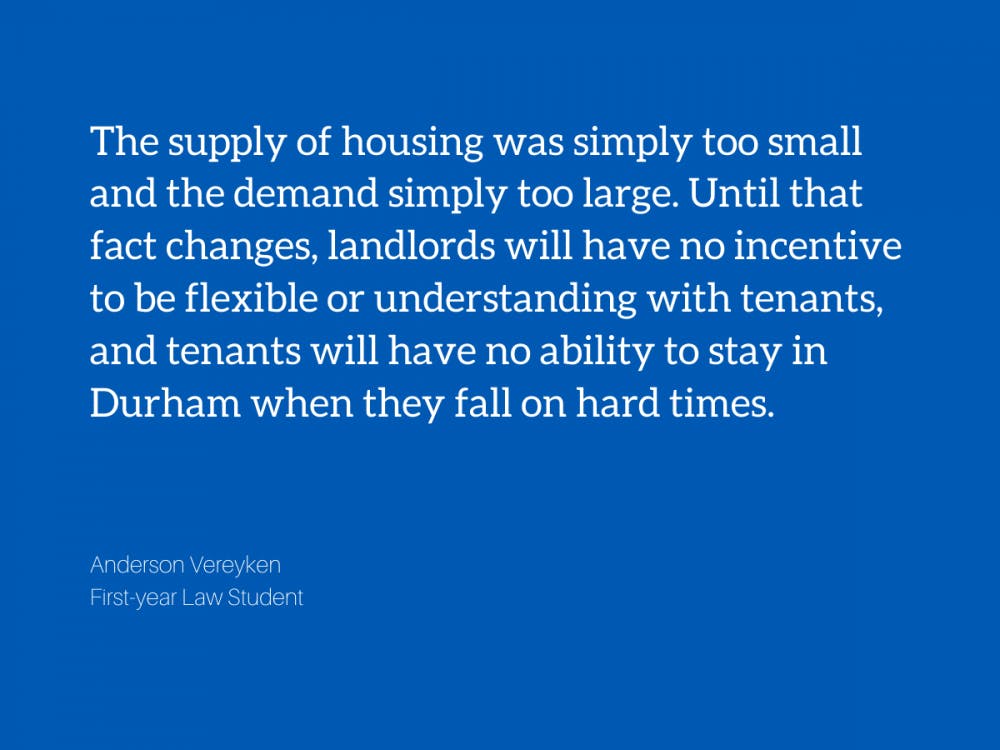While working in the field of eviction diversion, I saw family after family struggling to make rent in overpriced apartments. Many of these folks had grown up in Durham and watched it change into a different city, one in which increased development and a new trendy sheen had sky-rocketed the cost of living. Now, as noted in a 2019 report published by the National Low Income Housing Coalition, a person in Durham must work 2.8 full-time minimum-wage jobs in order to afford fair market rent for a two-bedroom apartment. If a person can no longer meet this financial hurdle and is evicted, the eviction becomes a permanent mark on their rental background and credit history. In a city like Durham, where the demand for housing is always rising, it often means that finding another place to live in the Bull City will be impossible.
Being able to help prevent or divert the eviction of others in Durham by recourse to the law was moving. However, it also often felt like a futile effort. For every individual we could assist, there were many more whom we could not. The supply of housing was simply too small and the demand simply too large. Until that fact changes, landlords will have no incentive to be flexible or understanding with tenants, and tenants will have no ability to stay in Durham when they fall on hard times.
Fortunately, a recent city proposal offers a first step in the process of disrupting this dangerous dynamic. The Affordable Housing Bond is a funding proposal based on a five-year affordable housing plan developed by City staff alongside the community. The bond promises to affordably house more than 15,000 low-income Durham residents. It will create more than 1,800 new affordable rental units and preserve more than 800 affordable rental units, most of them in downtown Durham. In addition, the bond will also move at least 1,700 homeless households into permanent housing; create at least 400 home ownership opportunities for low-income families; and stabilize more than 2,500 low-income renters in their homes through eviction diversion, emergency rental assistance, property tax assistance and repairs.
The entire plan costs about $160 million, and the $95 million bond up for referendum in this election is needed alongside current local and federal resources to make the plan a reality. That $95 million will come from an additional 1.6 percent tax on property values—which translates to an increase of $37 per year for the average Durham property owner.
A recent study performed by Duke students in Duke’s Data+ summer research program found that people of color and other historically disadvantaged groups are disproportionately affected by eviction in Duram, and passing the bond will help keep our city diverse and equitable. However, if those reasons aren’t convincing, it’s worth noting that all Duke students would directly benefit from affordable housing being widely available. Even though Duke undergraduates are required to live on-campus for three years and many are able to stay for a fourth, others will need to look to the community for housing. In addition, there is no on-campus housing for graduate or professional students—we have to find a place to stay in or near Durham. Even if Duke students aren’t actually living in the places the bond will create or renovate, increasing the supply of housing will help temper the demand for apartments and go a long way to keeping citywide rents down. That’s something we can all get behind. And, let’s not beat around the bush—the bond is being funded through a property tax. There aren’t exactly many undergraduate students with houses.
I’d like to end with one final thought. Folks our age are often unenthusiastic or unwilling when it comes to voting. They feel disenfranchised and disillusioned, worried their voices can’t change anything. But this just isn’t the case when it comes to the bond measure. In local politics, where the voting population is low and turnout even lower, every single vote matters. If one person reads this and decides to vote for the bond, it will make a difference. If ten people go out and vote, it could quite literally be the reason the bond passes.
Please consider voting for the Affordable Housing Bond this November 5 in the Durham Municipal Elections. For more information on the bond, including a precise breakdown of how all funds will be spent, visit durhamaffordablehousingbond.com.
Anderson Vereyken is a first-year student in the Duke University School of Law.
Get The Chronicle straight to your inbox
Signup for our weekly newsletter. Cancel at any time.

